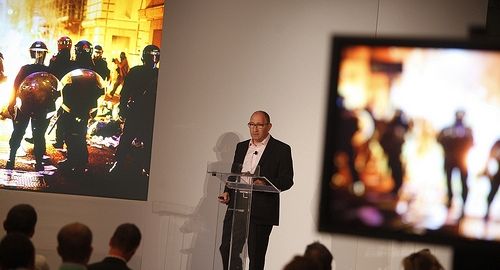In his inaugural address (which, to many, now seems a lifetime ago), Obama spoke beautifully about a ‘new era of citizenship and responsibility’. We should look to our fellow citizens for trust and to be trusting. But the trending rise in peer‐to‐peer trust that we saw in the first decade of the twenty‐first century has begun to dip and fall away. Mayb because wehave cometo realise that five hundred friends on Facebook or a thousand followers on Twitter are not in fact friends at all? Maybe because that trusted medium has now become mainstream and therefore subject to the Trust deficit from which mainstream media suffers. The naked truth is that we trust our peers less than we did a few years ago, even though Facebook contends that a friend’s recommendation makes a consumer three times more likely to purchase. ‘New’ media is heading the same way as ‘old’ media, as it, itself, enters the mainstream.
Fourth, possibly as a result of the first three points, we are seeing the continued dispersion of authorty within ou connected world. Old pyramids and hierarchies are crumbling and being replaced by flatter structures. We are seeing this in business, where the employee is gaining a greater share of voice and, some may say, this is translating into the democratizing force that the Arab Spring properly represents.
Of course, PR people have traditionally prided ourselves on our ability to shape and control narratives. But with every month that passes, it becomes clearer that citizens are taking over – becoming the co‐authors (at least) of their own narratives – whether in Tahrir Square on in the shopping mall. Some of the hype and hyperbole of Web 2.0 is now being realised. Power has shifted from old media to new; from the centre to the edge. Sina.com’s Weibo microblog – the Chinese equivalent of Twitter – now has over 200 million users. The web 2.0 genie is out of the bottle, no matter how much the Chinese government worries about it.
So, governments, businesses and organisations have to engage with – and take seriously – a world of varied, discordant and at times hostile voices in a range of traditional, hybrid and purely social ‘media’ settings. There are good conversations to be had. But participation is required. As Noonan pointed out, silence will only be filled by rumour and invention.
Fifth, the demand for Transparency and Accountability is fundamentally altering the shape of Trust. This is not just about how companies – and indeed governments ‐ report; it is actually about how they behave. ‘Open, honest and frequent communications’ regularly tops the poll for companies that are most trusted. Companies and (political) leaders who are not clearly accountable will be trusted less. Leaders need to be candid. They must be open about the difficulties they face and the improvements they make. They need to embrace a new humility – no longer presuming to know best or be defensive with critics. And, in business, they need to better align their successes or failures with their pay and rewards. Executive compensation is a vital consideration in the trust stakes.
Sixth – and finally ‐ the convergence of everything only serves to increase the complexity – and thus the fragility also. We see Corporate and Brand coming together; the merger of Profit and Purpose; the new Partnerships of Government and Business. These are the new realities, as well as the new complexities – all of which underline the inter‐dependency of everything. We cannot broadcast in silos any longer; we have to share in communities; we need to build mutuality if we are to earn trust.
There is a final point to be made on Technology. Many make the repeated mistake in believing that ‘technology’ is driving the new trust landscape. This is only partially true. It is not about whether we trust twitter, trust Facebook or trust those who ask us to opt‐in on our mobile devices. It is much more about how technology is driving deep behavioural change ‐ the access to information is now, after all, enshrined as a fundamental human right – that is, in turn, leading us to better understand the role of shared purpose, shared values, shared interests. I would argue that a failure to understand the behavioural dynamics of technology represents a failure to understand trust and influence at all.









